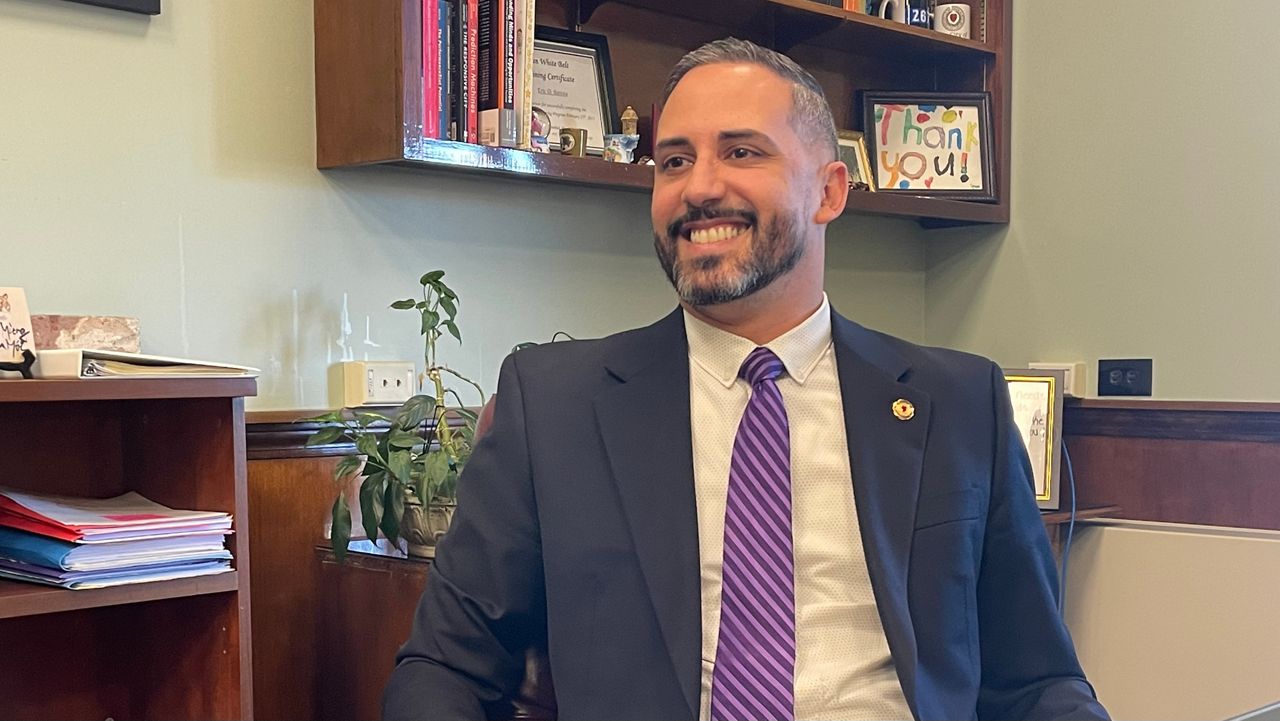WORCESTER, Mass. - Worcester City Manager Eric Batista is here to stay after the Worcester City Council officially gave him the job permanently last week.
What You Need To Know
- After serving as Worcester's acting city manager for six months, Eric Batista was given the job permanently last week
- Batista is the first Latino and person of color to hold the position of city manager in Worcester
- His priorities for the city include more diversity and inclusion efforts, addressing the lack of affordable housing and boosting the city's hiring efforts
Batista, 39, was appointed acting city manager at the start of June after former City Manager Ed Augustus stepped down from the role that he had held for nearly eight years. Batista first joined the city manager’s office in 2012, where he served as chief of operations and project management.
A native of Puerto Rico, Batista is Worcester’s first Latino and person of color to hold the position of city manager. Spectrum News sat down with Batista to learn more about his priorities and insights for the future of Worcester.
Having already been in the office since June, Batista said being in the role permanently will not change the way he views the city.
“I don’t think my outlook changes, because of the work that I've been doing over the past six months, and also over the past 10 years,” Batista said. “That perspective, that engagement with the community and the council continues.”
Diversity and inclusion are at the forefront of not only Batista’s mission, but the city as a whole. Worcester is a diverse community, including a large Latino population making up nearly 24% of city residents, according to the U.S. Census Bureau.
Instead of viewing being Worcester’s first Latino city manager as a personal achievement, Batista sees the milestone as confirmation that the city’s diversity initiatives are headed in the right direction, with more diversity and inclusion efforts to come.
“People should be proud, because there's been a lot of advocacy,” Batista said. “A lot of folks have been working, communicating, having conversations, late meetings, morning meetings, years and years of really advocating for equity around leadership in the city. This is a moment of celebration for those folks who have done that.
“But it also puts things into perspective here in which we have to do our part in making sure that we're structurally putting the right resources behind this work, that we're putting the right people in the right places to be successful.”
One major hurdle that the city continues to face is the lack of affordable housing, which is resulting in increasing homelessness. Block grant dollars, inclusionary zoning, the establishment of the Affordable Housing Trust Fund and the allocation of American Rescue Plan Act funds into the new trust fund are all ways that the city is trying to combat the challenges, Batista said.
“I think one of the biggest challenges is when you have a real estate market that is significantly growing, it's booming not only in the city but across the nation, it creates those compressions that we start to deal with in the city,” Batista said. “But we're going to continue to work at it. Council is working with me on making sure that we're thinking collectively of policies and funding sources that we can put out to the community.”
In addition to affordable housing, Batista explained that Worcester is currently navigating ways to find enough houses to accommodate its rapidly growing population, which has grown 14% in 10 years according to the census. In addition to Boston residents moving out west toward Worcester, other groups such as asylum seekers and refugees are also gravitating toward the city further adding to the greater need for housing, Batista said.
“If we don't create a supply for that demand, then we're going to be in a bottleneck where we won't have enough opportunities, which creates the high rents and creates the inability for folks to find housing units at a more rapid rate,” Batista said. “And so those are the challenges that I think we're facing now. But we're going to continue to work with developers and utilizing these affordable housing tools to increase the housing stock in the city.”
As with all facets of businesses and governance in a post-COVID world, the city has also struggled to find a reliable workforce to fill its open positions, particularly among its Emergency Dispatch Department, which faced extreme burnout during the pandemic.
Batista said through the “Work for Worcester” campaign, the city is hoping to attract employees to fill positions that include everything from mechanics and librarians to accountants and DPW workers. The city just hired a director of public health and is actively looking for a new chief diversity officer.
As part of his leadership strategy, Batista also created listening sessions where he met with members of the community to hear comments and complaints directly from the residents. During these conversations, Batista said he discovered that diversity and inclusion, equity, affordable housing, homelessness and concerns about the lack of trash removal were at the forefront of residents’ minds.
“I can clearly articulate a vision of what I want for the city, but then it would become only Eric's vision,” Batista said. “It's not the city of Worcester’s vision, and the residents of this community’s vision. So I want to take time to listen to the residents, to hear from them in terms of what their needs are, what some of the issues that they're facing are, and hear from council as well and the leadership there. That will then start to develop the vision.”



